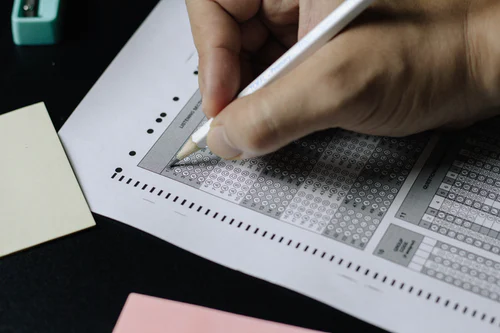MCAS and Remote Learning Do Not Mix Well

(Photo Source: UNSPLASH)
March 30, 2021
Despite the craziness of remote learning, the Massachusetts Comprehensive Assessment System (MCAS) will be taking place this May for high school students. Is it really necessary for students to take a test that will highlight the obvious: that students have not learned as much as they would any normal school year?
Remote learning has been a huge adjustment for everyone, including teachers, students, and administrators, and most can say they are still getting used to it. Compared with face-to-face learning in school, it is very challenging for students to master the material covered on these remote days through Zoom calls, and most students do not learn to the maximum extent.
Pentucket Sophomore Alex Robertson expresses that the only time he feels like he is genuinely learning is when he is inside the classroom. “On remote days, I just sit and watch a video, do a worksheet, and then forget about everything,” he explains. “It’s like the information goes in one ear and out the other.”
Learning inside the classroom is absolutely essential for students’ academic growth. Without this in-person learning, students are not truly comprehending the information presented to them. “It is pretty clear that us kids are struggling enough as is with the new learning style, and MCAS will only make this more difficult for us,” Robertson says.

Considering students have not been able to fully comprehend most of the topics covered throughout this remote year, failure rates are bound to rise on the MCAS. This also means that students have a greater risk of not graduating.
Massachusetts requires all high school students to pass the sophomore MCAS as a requirement to graduate. Therefore, if a student fails the MCAS, he or she must retake it and get a passing score, or else that student cannot graduate. With self-confidence low and 60 percent of students surveyed feel there is a greater chance of not passing, more students than ever are likely to fail.
On the other hand, some say that standardized testing will be a great opportunity for states to get a gauge of where students are at with their learning. Ian Rosenblum, an Assistant Secretary for the US Department of Education, wrote, “We must be prepared to address the educational inequities that have been exacerbated by the pandemic… using student learning data to enable school districts to target resources and supports to the students with the greatest needs.”
However, the risks are too great for MCAS to be just a gauging factor.
Kaileigh Moriarty points out, on behalf of all sophomore students, the impact that MCAS will have on them this year. “Every year we are told, ‘it only matters [in] 10th grade,’ and now we are here as tenth graders with a crazy school year.” For sophomores, this is a crucial year for obtaining scholarships through the MCAS test. Sophomores are distressed that the year they have the most opportunities for scholarships is also the year when they are least prepared to receive these scholarships. It is unfair.
Even teachers, who see firsthand where students are in their academic courses, acknowledge that students are not prepared to take the MCAS. Time is critical in an already shortened school year, for there is not enough time for teachers nor students to prepare for testing. MCAS testing will consume the little and precious time that schools cannot afford to lose.
Mr. Andrew Casey, an English teacher at Pentucket, says, “I would normally spend a good chunk of time previewing vocab for certain books and stories…Sadly we have not had the time to set aside one class per week solely for grammar.”
Teachers like Casey have had to shorten, even eliminate, the time devoted to important topics, such as grammar, due to time constraints. With extra time being devoted to getting organized, it is nearly impossible for teachers to be able to use every second as productively as they would in previous years. Without the normal coverage of essential topics, students cannot take the MCAS as successfully.

As students return to school full time within the next couple of months, it is important for schools to focus on welcoming students back smoothly and effectively instead of rushing into the preparation and stress that accompanies MCAS.
MCAS testing this year is completely unnecessary when more students than ever before are bound to fail. Testing this year would not be indicative of a student’s intelligence; it would only prove that students have not learned as much this year, an already obvious truth. Students and teachers recognize this, and now is the time for the US Board of Education to realize the detrimental effects of testing, and cancel MCAS in this disastrous school year.











Alex Robertson • Apr 7, 2021 at 8:00 pm
I think this article is very well written. I definitely agree with the fact that the high school should focus on welcoming kids back smoothly instead of rushing into the chaos of MCAS and standardized testing. Seeing as high school students will likely be returning in late April/May, and this is when MCAS practices and testing is, this will likely cause an overlap. Returning back to school will be another big adjustment which kids will need time to adjust to, and MCAS on top of this would be an additional stress factor.